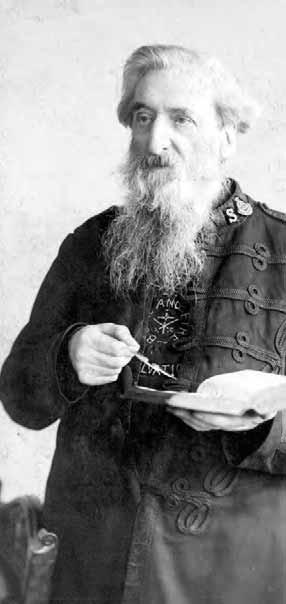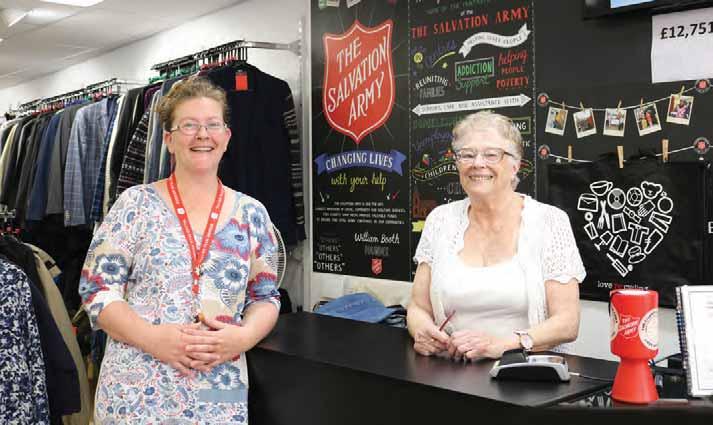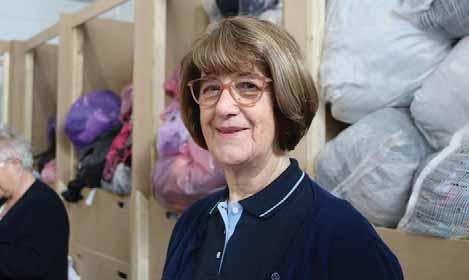
14 minute read
Feature
The baptism of fire
An excerpt from an address by William Booth, published in Salvation Soldiery, 1889y
GOD only knows what he would do with a few men who cared only for him. He would save thousands and astonish the universe. O God, make us all alike – all for thee.
I was hurrying to catch an express train to London the other day, and was reckoning upon the train upon which I was travelling meeting it, but it was too late – not very late, but just late enough to let the other go and leave me behind, with a wounded leg, hurt through scrambling to catch it. I shall never reckon on that train again. God wants men and women that he can reckon upon, who will be there at the very time he wants them, and do the very work he wants doing, whatever may stand in the way.
My brethren, God is in full sympathy with you. He is a great deal more human than we have taken him to be. We too often think and talk of him as though he were a great being sitting on the circle of the universe a long way off, in some sort of dense fog; too far away to see or hear anything very distinctly; and only communicated with by a sort of imperfect telegraphy – a hard-hearted, unsympathetic, stolid, immovable being.
All this is opposed to the most direct teachings of the Bible. There, God is represented, by every conceivable form of statement and illustration, as a being of most impressible sensibilities – loving, hating, repenting, rejoicing, sorrowing, troubled on defeat and triumphant on victory. When I go to bed at night after a hard fight, in which to all appearance I have been badly beaten, I think of him as feeling much as I do; and he comes to me and says, ‘Never mind; we’ll have another turn at them tomorrow, and we shall be too many for them in the long run.’
There is no mistake about it, and there is no advantage in denying the fact, that the Devil has got the world in his power at present. But it shall not always be so, and God is only waiting for a people by whom he can conquer. For still, as of old, ‘The eyes of the Lord run to and fro throughout the whole Earth, to shew himself strong in the behalf of them whose heart is perfect toward him’ (2 Chronicles 16:9 King James Version). And we can only be made such by the Holy Ghost.
Always acknowledge what God does by and for you. I think we do ourselves harm, and greatly grieve the Holy Spirit, by not acknowledging what he does for us. We forget, if we don’t actually deny, his co-operation, and then we get downcast and grumble. I don’t say, because I don’t for a moment think, that there is any danger of our not acknowledging what we do. The Devil is always ready to prompt us to say, ‘I did this and I did that, and I did it well,’ and others are always ready to speak of what we do. But we do err, I am sure, by not sufficiently acknowledging and glorifying the co-operating work of the Holy Ghost. Why not say, ‘The Holy Ghost was at work this afternoon. We have had a hard night, but the Holy Spirit has done his work. Blessed Spirit, I thank thee’?
Before we go to our knees to receive the baptism of fire, let me beg of you to see to it that your souls are in harmony with the will and purpose of the Holy Spirit whom you seek. See to it that the channel of communication by which the baptism must be received is open.
I heard of some people the other day who could not get any water. They turned the tap repeatedly, but no water came. They sent to the office of the company, who sent a man to examine the connections and fittings, but all was right: plenty of water in the reservoir; pipes, taps, connections, all right, but no water. At last they pulled up the pipe and found a mouse in it.
It is no use turning the tap, praying, singing, or even believing, if there is something you are holding back or refusing to do – some idol, something about which you feel condemned, but which you refuse to give up, something in the pipe. Out with it, give it no rest, drown it, give it up. Destroy your idols and hindrances and stoppages with an everlasting destruction. Let there be free communication between your souls and God. Let all go, and you shall be flooded before you rise from your knees. The world shall feel the power of it, and God shall have all the glory.
The Spirit of witness
Lieut-Colonel Jonathan Roberts looks at how the early Church’s reliance on the power of the Holy Spirit is an example for our witness today

IN 1964 the British Army was involved in a conflict in Borneo. The British troops included some Gurkha soldiers from Nepal, who were asked to jump from transport planes into the jungle. They had not been trained as paratroopers, but they agreed to do it as long as the plane flew as slowly as possible and no more than 100 feet above ground level.
The British officer told them that planes always flew slowly when dropping troops, but never as low as 100 feet because, if they did that, the parachutes would not open in time.
‘Oh, that’s all right then,’ said the Gurkha sergeant, ‘you didn’t mention parachutes before!’
For many of us, witnessing for Jesus is almost as daunting as jumping without a parachute. We can feel unprepared, poorly equipped and fearful. Perhaps we get nervous about sharing our faith with other people – worried that we’ll say the wrong thing or, even if we manage to witness well, doubt that what we say will have any impact on them. We might even be afraid of the response we’ll get.
It is a challenging task, but Jesus does not expect us to do it without help. Just before ascending to Heaven he told his disciples: ‘You will receive power when the Holy Spirit comes on you; and you will be my witnesses in Jerusalem, and in all Judea and Samaria, and to the ends of the Earth’ (Acts 1:8).
That promise of enabling power was fulfilled at Pentecost when the disciples were filled with the Spirit. So, how did the Spirit empower the witness of the early Church and how can he do the same for us?
The overflow of the Spirit
On the Day of Pentecost the Spirit-filled disciples were propelled into mission and 3,000 people were saved. John Stott writes in The Contemporary Christian: ‘We watch enthralled as the missionary Spirit creates a missionary people and thrusts them out on their missionary task.’ From then on they continued to preach the gospel, and the Church continued to grow.
In the Great Commission Jesus had commanded his disciples to ‘go and make disciples of all nations’ (Matthew 28:19), but the missionary activity of the early Church was more than just obedience to a command – it was an overflow of the Spirit. When Peter and John were called before the Jewish leaders and told to stop speaking about Jesus, they said, ‘We cannot help speaking about what we have seen and heard’ (Acts 4:20). They just couldn’t stop themselves from witnessing!
If we allow the Spirit to fill us to overflowing, the same can be true of us. Instead of sharing the gospel reluctantly
or just because it’s expected of us, it can be a natural expression of the Spirit’s presence within us.
The power of the Spirit
The Holy Spirit not only inspired the early Church’s evangelism, but also empowered it. The Spirit-energised witness of the first Christians brought people to faith and made the Church grow. When Paul wrote to one of the early churches about his work there, he remembered that ‘our gospel came to you not simply with words but also with power, with the Holy Spirit and deep conviction’ (1 Thessalonians 1:5).
Perhaps in less dramatic ways the same is true today. The Spirit can make powerful use of our witness, no matter how inadequate we feel it is, by taking our words, planting them like seeds in a person’s heart and using them to influence their thoughts and feelings about God.
In his book, Meeting Jesus, Major Howard Webber recalls his time as a corps officer and mentions a man who knelt at the mercy seat one Sunday. This man was the husband of one of the soldiers but didn’t profess faith in Christ. A tragedy in the family meant that Howard spent a lot of time with the couple and was able to talk to the man about faith, but there was no indication that he was getting through. That was until the Sunday when he attended a meeting and knelt at the mercy seat. Howard writes: ‘I realised that there is more going on in people than one can ever detect.’
The Spirit is at work even though we may not recognise it – and even if we never see a response. That’s why Agape, a global mission organisation, describes witnessing as ‘taking the initiative to share the gospel in the power of the Holy Spirit and leaving the results to God’.

The guidance of the Spirit
Acts relates some remarkable instances of guidance in the early Church. The Spirit sent Philip to talk to an Ethiopian eunuch, which resulted in the man’s conversion (see Acts 8:29–38), and sent Peter to the home of Cornelius, which led to the acceptance of Gentiles into the Church (See Acts 11:12–18). The Spirit directed the church at Antioch to commission Paul and Barnabas, who were then ‘sent on their way by the Holy Spirit’ on their first missionary journey (Acts 13:4). Modern-day disciples also need to be open and responsive to the guidance of the Spirit. Our experience of this may not be as spectacular as in the early Church, but it is just as important. It happens as we spend time in prayer, seeking God’s will and committing ourselves to doing it, asking for help to see opportunities for sharing our faith and for sensitivity to know when it is right to speak or better to let our actions do the talking.
We live in a different culture from that of the early Church, but the call to witness remains the same. And while it can be a daunting prospect, it’s good to know that we don’t have to jump without a parachute. As in the early Church, and ever since, the Spirit can inspire, empower and guide us.
Shining in our shops
IF you were to join a conversation about the retail sales performance of Salvation Army Trading Company Ltd (SATCoL), the weather is a topic that will likely pop up. It is sometimes cited as a reason for good sales performance, and sometimes for not-so-good sales performance. In these challenging days for the high street, predicting sales is as reliable as predicting British weather.
Monday 12 April was the day when SATCoL shops in England reopened, followed two weeks later by our shops in Scotland. ‘Reunited’ was the celebratory message from Nicola Crawford, regional manager for the north.
‘As the retail team in Scotland watched from the sidelines, they missed being part of the exciting sales activity,’ she said. ‘Fast forward two weeks and they were so happy to be open again and working alongside their teammates!’
The joy of reuniting with colleagues was a theme across all SATCoL shops. Many consider their team as family, and their local community as an integral part of that extended family unit.
‘Wow, it was incredible,’ shared Louise Elcox, manager at Filton donation centre, on BBC Radio Bristol. ‘We had such a buzz and didn’t expect the volume of people coming in. And not just people donating … it was also people coming in to have a chat. Some people have been isolating and not met anybody. It was such an amazing feeling.’
Kevin Jennings, the Maldon shop manager, commented after the first day: ‘My feet ache, my mind is a little tired, several bones are telling me that enough is enough, but my soul is on fire. It’s wonderful to be back open.’
‘It’s been absolutely brilliant,’ said Joan Lloyd, a volunteer at Hinckley donation centre. ‘Everyone has happy faces and it’s busy. We all get on well together and it’s a lovely atmosphere. My late husband, David, and I have connections with Hinckley Corps dating back to 1961 when we met. When David died in 2017, it was faith that helped me through and, when the opportunity to work for SATCoL came up, I saw it as another way to give service.’
In a year of unpredictability, forced shop closures, reopenings and more shop closures, one thing we know remains steadfast: our retail team’s unerring commitment and enthusiasm to reopen their doors to their communities.

Sales Assistant Sarah Kilden and volunteer Eileen Lane, Tonbridge
As the big day approached there was an underlying nervousness. Would people come out to shop or would they remain at home?
By midday on the first day, it became clear that something remarkable was happening. A message from the head of retail, Chris Jestico, announced that we had already made record sales. Even with shops in Scotland still closed, our shops in England had achieved the most successful trading day in SATCoL’s history. Scotland followed suit with their shops’ remarkable opening-day sales two weeks later.
As a company whose values align with The Salvation Army, what do record sales mean for SATCoL? Should we shout from the rooftops about our success when our role is to serve? Celebrating success, externally at least, is not something that SATCoL does often. Are we relieved? Yes. Are we grateful? Extremely.
The sales, of course, show us that we are serving our customers well, and that’s important. So too is making a recovery, which is the focus of SATCoL’s board and every colleague. A full recovery in our retail business and all
Kelly Castelete describes what happened when SATCOL charity shops reopened in April

Largs

Swinton
our divisions means that we can continue to serve our communities and raise funds for The Salvation Army.
However, we must recognise and give thanks for the special ingredients of a successful local charity shop. It is these that led thousands of customers to choose a Salvation Army charity shop as their first retail visit post-lockdown and happily queue outside.
Reflecting on the first full week of trading, SATCoL Managing Director Trevor Caffull shared this message with colleagues: ‘There are no hidden secrets involved in these kinds of results ... pent-up demand being met by the commitment, the excellence and the responsibility of our staff and volunteers. And all this came, of course, after a week of hard work getting shops ready, transforming them from winter goods to spring and summer, and once again making sure that we were Covid-secure in all areas. Thank you all, and thank you to every single person working in a supportive background role who, in any number of ways, helped make these results possible.’
When I first joined SATCoL I visited some shops and donation centres and was privileged to meet many of our wonderful colleagues. I remember writing about SATCoL in those early days. I would think about everyone I met.
At our Tonbridge shop the volunteers and staff love playing their favourite music and will have a little dance, and customers join in. A visit to our Piershill donation centre will reveal the passion they have for games, which goes even as far as finding missing pieces to create a complete puzzle to sell. When I joined the Barnsley team on their opening day there was much laughter served with a good amount of Salvation Army hospitality. I left with a big smile on my face.
Not only do volunteers and staff in our charity shops help each other, their communities and customers, they also continue to inspire me in my work. Their impact and help go beyond the four walls of their shops in more ways than they will ever know. When you receive that kind of inspiration from colleagues, you don’t need good weather to make good sales because in our hearts and in our shops the sun is always shining.











